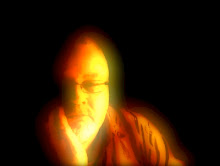then there is the mystery
of upward-falling rain
how eyes become prisms
bending tomorrow’s light
and the future draws a line
across the palm of the hand
how wind blows towards us as it leaves
how thunder’s slow handclap stills itself
how the sun is returned to heaven
in the heartwood of trees
how light is revealed by darkness
how it burns in the secrecy of shadow
then
the mystery of rain and weather
how water can be so fine
how water can be so fine
so cold and fine as to fly above
every known and unknown thing
how time as unseen as clouds moving
passes behind our restless waiting
shifts day into night season into season
draws itself on faces and hands
lays down questions seldom broached
how vapour recognises ocean
how clouds remember direction
and the wind coils them high to low
then there is the mystery of our rising
day by day waking to promise and open sky
stretching in slow inches reaching out
to where a fingertip might understand
or a blinking eye might come to see
the mystery of ourselves and the wonder
we leave behind or stumble on in unlikely places
as if our feet knew the way while we did not
and we rise and we fall wake and sleep
with these questions in our pale-lipped dreams
asking for solutions for absolution or an answer
instead of listening in the wind to its direction
in the rain as it falls and invisibly rises
I was reminded of an early perceptual psychology experiment where subjects had to wear prism adapting glasses. The one I heard of in 1970 involved vertical distortion which turned the observed world upside down. The adaptation effect was that perception adjusted vision so that everything returned to normal. The exception was that sudden changes would be perceived without perceptual adjustment. In a shower of rain, for example, rain would appear to fall upwards.
Why I remembered this, I don’t know but it made me think of paradoxical events in nature: how rain rises so it can fall, what connects light and darkness. In short, I was exploring the cycle of life against entropy, the circular nature of growth and decay.
In the end all I had to do is put human agency into the mix. It’s what poems do, I suppose…
how time as unseen as clouds moving
passes behind our restless waiting
shifts day into night season into season
draws itself on faces and hands
lays down questions seldom broached
how vapour recognises ocean
how clouds remember direction
and the wind coils them high to low
twists in the vortex of storm
then dies to a whisper
rainfall remembered
then there is the mystery of our rising
day by day waking to promise and open sky
stretching in slow inches reaching out
to where a fingertip might understand
or a blinking eye might come to see
the mystery of ourselves and the wonder
we leave behind or stumble on in unlikely places
as if our feet knew the way while we did not
and we rise and we fall wake and sleep
with these questions in our pale-lipped dreams
asking for solutions for absolution or an answer
instead of listening in the wind to its direction
in the rain as it falls and invisibly rises
© BH, 2020
I was reminded of an early perceptual psychology experiment where subjects had to wear prism adapting glasses. The one I heard of in 1970 involved vertical distortion which turned the observed world upside down. The adaptation effect was that perception adjusted vision so that everything returned to normal. The exception was that sudden changes would be perceived without perceptual adjustment. In a shower of rain, for example, rain would appear to fall upwards.
Why I remembered this, I don’t know but it made me think of paradoxical events in nature: how rain rises so it can fall, what connects light and darkness. In short, I was exploring the cycle of life against entropy, the circular nature of growth and decay.
In the end all I had to do is put human agency into the mix. It’s what poems do, I suppose…
Here’s something on Prism Adaptation, by the way: https://en.wikipedia.org/wiki/Prism_adaptation


No comments:
Post a Comment